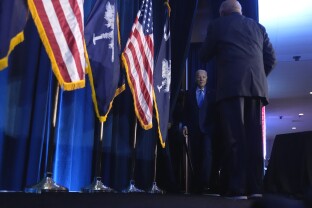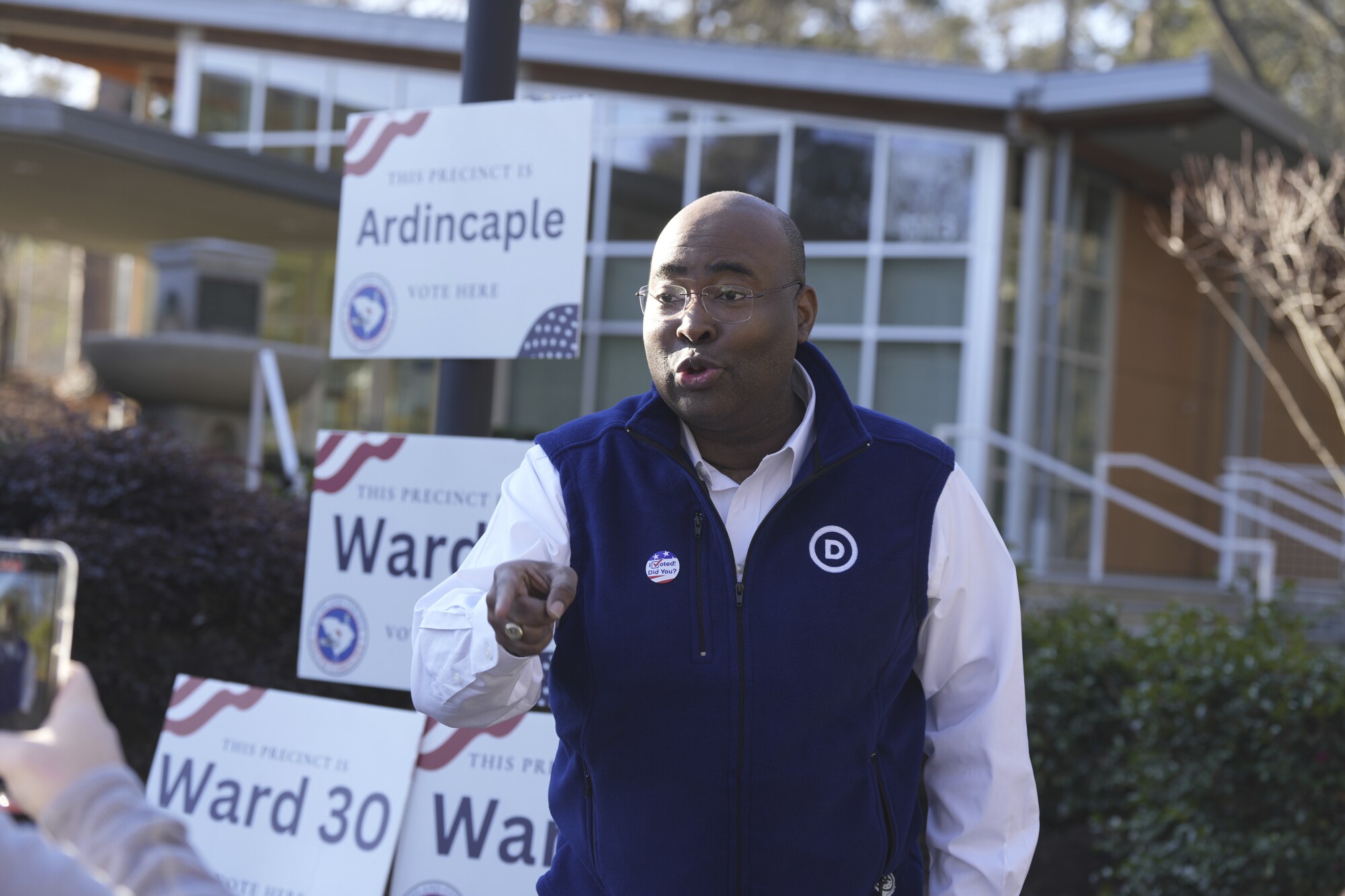Only 4% of registered voters in South Carolina turned out for the Democratic primary this weekend. As the numbers rolled in, Democratic National Committee Chair Jaime Harrison said he was “ecstatic.”
The day before the election, state Rep. Robert Williams told NOTUS low turnout would indicate “it would not have been worth it” for South Carolina to march to first in the primary calendar. But the Biden campaign didn’t expect turnout to be high, a Democrat close to the campaign said. The work that went into this year’s primary — where Democrats said an unchallenged incumbent was unlikely to draw out the masses — was about 2028, when a competitive primary is more likely.
Democrats put in more effort, covered more miles and invested in more organizing to prove that it was the right decision to move South Carolina from fourth in the calendar to first and that they could handle it.
So will South Carolina go first again in four years?
“What’s the state motto, ‘While I breathe, I hope’? I’m gonna do everything in my power to make sure because I think the state deserves to have this opportunity again to showcase itself,” Harrison said.
Democratic operatives in South Carolina make three arguments for why the contest should return in four years.
First, South Carolina first-in-the-nation status gives Black voters more of an opportunity to have impact and make real change. (The state is 30% Black. New Hampshire, which is 90% white, held its primary ahead of South Carolina, but Biden’s name did not appear on the ballot.)
“As someone who is African American, and knows the history and knows Black people haven’t always had the right to vote, especially living in the South, it’s worth it,” voter Nicole Cooper told NOTUS. “We don’t take that right lightly.”
After the results, Harrison called going first “impactful” for many in the state because “the hands that picked cotton are now the hands picking presidents.”
Second, holding the first primary brings high-profile attention to issues people in the state care deeply about. At a recent stop in Orangeburg, Vice President Kamala Harris talked about Monica and Shawn Williams, a Black couple who are pushing for their state to pass a hate crime law after white neighbors burned a cross on their lawn and verbally assaulted them with racist epithets (the neighbors faced only harassment charges as South Carolina does not have a hate crime law).
“Like I tell my students a lot of times: Coming in second is the first to lose,” Monica Williams said during the Harris event. Shawn Williams added, “Hopefully the momentum from [going first] can help push that bill forward into becoming law.”
And third, the money. Having South Carolina vote first, multiple Democrats contended, meant more money for down ballot races and voter education by the state party.
“Having these big fundraisers, having all this national interest does create more investments so we have more resources to pick up our state house seats in November,” Christale Spain, South Carolina’s Democratic Party chair, said.
Biden’s 2020 win in South Carolina gave him the momentum to win the nomination, after losses in Iowa, New Hampshire and Nevada. He and the party pushed to move South Carolina’s primary ahead of other states, over even the objection of Rep. Jim Clyburn, who is widely seen as responsible for turning Biden’s 2020 campaign around.
“I was a little bit disappointed South Carolina was playing this role,” Clyburn told NOTUS last month, likening his home state’s traditional spot after Iowa, New Hampshire and Nevada to baseball’s “cleanup hitter” — the fourth batter in the lineup — who has the best chance of “knocking it out the park.”
“South Carolina was in fourth place. I enjoyed that, you know? I said, ‘Let them do what they’re gonna do in Iowa, when they get to South Carolina, we can clean this up.’ So I was having fun with that. Joe Biden had a different feeling about it,” he said.
On Saturday night at a watch party in Columbia, as the president’s decisive win was made official, NOTUS asked Clyburn if he still missed his beloved fourth-in-the-nation but first-in-the-South position: “I’ll always feel that way,” he said. “But that’s got nothing to do with whether or not diversity ought to be put at the front of the line. And that’s what Joe Biden did here.”
But with more power comes more responsibility, and inevitably, more stress about losing the position. Multiple local operatives told NOTUS there was some worry that without a stellar performance, South Carolina’s first-in-the-nation primary could be a one-time deal.
Even before the votes were counted, finger pointing at who would be to blame for a dismal outcome had already started.
“If it does blow up in our faces, I’m sure [the DNC] will try to point to the SCDP,” a state Democrat with close ties to the party told NOTUS. “We’re Southerners, we already feel that vibe anyway, we feel that vibe that we’re not appreciated.”
Democrats were careful not to publicize a prediction for turnout in the state, due to the barely contested nature of the primary — voters would inevitably sit out from the lack of competition.
Williams, the Democratic state representative, also said he thought that the SCDP could have worked harder in driving turnout, pointing to voters who were unaware the primary was taking place at all.
“We’ll see what happens in four more years,” said former Alabama Senator Doug Jones, who was in the state on Friday. “We’ll see how this turns out and whether or not we’ll continue to do it, but I kind of think it’s here to stay.”
A source close to the Biden campaign told NOTUS that the point of South Carolina going first was not for Biden to win (that was already a done deal, they said) but to change the way “Democratic electoral politics work.”
“Every campaign will have to think through their message to Black voters first,” the source said. “It puts their struggles and the issues that matter to Black voters into the national spotlight, where instead of candidates coming up with ethanol policies for Iowa, they’re now looking at hate crime law and Black maternal health.”
Biden, who was not in the state for election day, phoned into the watch party on Clyburn’s phone minutes before his win was announced. He thanked staff on the ground for their work as Harrison held the phone to the mic.
Sign up for daily updates from NOTUS.
“So what happened?” the president could be heard asking. Harrison awkwardly told him the results hadn’t come in yet. But when Biden’s win was announced, the DNC and state party declared that the smaller primary was a success. Biden had won handily, and according to Spain, Democrats had added 6,000 voters who cast their ballot for the Democratic Party for the first time, early votes went up by 30% and increased Black voter participation in early voting — and it all went off without a hitch.
Clyburn took on a conciliatory tone in his remarks to the limited crowd, telling Harrison the DNC rules committee should let New Hampshire delegates vote at the Democratic National Convention in August, despite defying Democrats’ wishes for South Carolina to officially go first. (Biden won the state with a write-in campaign.)
“Let’s bring this country together,” he said.
—
Jasmine Wright is a reporter at NOTUS. Tinashe Chingarande is a NOTUS reporter and an Allbritton Journalism Institute fellow.
Sign in
Log into your free account with your email. Don’t have one?
Check your email for a one-time code.
We sent a 4-digit code to . Enter the pin to confirm your account.
New code will be available in 1:00
Let’s try this again.
We encountered an error with the passcode sent to . Please reenter your email.



